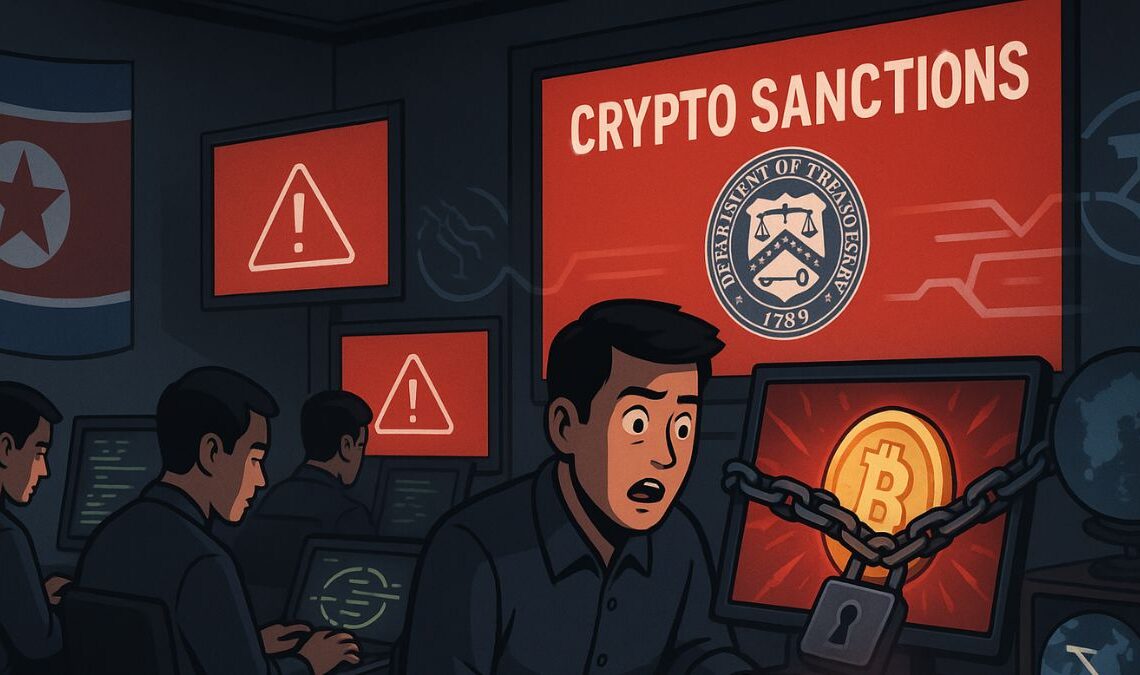The United States has escalated its efforts to curb illicit digital asset operations by imposing new North Korea crypto sanctions targeting a crew of IT workers allegedly engaged in widespread crypto theft and fraud. The announcement, made by the US Treasury on July 8, marks a strategic shift in how the U.S. government addresses state-sponsored cybercrime.
According to the official press release from the US Treasury (source), these North Korean nationals were employed abroad under false identities. They infiltrated various international companies and remote positions while covertly funneling income back to Pyongyang, bypassing international financial controls.
Treasury Highlights Scope of the Scheme
The North Korea crypto sanctions specifically target individuals linked to the country’s military-backed cyber units, including Lazarus Group affiliates. These sanctioned workers reportedly gained employment as freelance IT specialists, where they exploited legitimate platforms to deploy malware and access internal systems.
The operation allowed North Korea to acquire illicit funds, evade UN sanctions, and bolster its nuclear and ballistic missile development. In its statement, the Treasury stressed the importance of a globally coordinated effort to prevent crypto-fueled money laundering activities:
“These IT workers are part of a vast network that fraudulently obtains employment and then exploits that access to steal funds and intellectual property.”
The designations mean that any US-based entities or individuals who interact with the named persons may now face secondary sanctions.
A Broader Pattern of Crypto Misuse
This move is the latest in a series of actions targeting North Korea’s exploitation of digital assets. Blockchain intelligence firm TRM Labs (source) has previously highlighted the DPRK’s growing reliance on stolen crypto to finance its regime. The firm estimates that over $3 billion has been stolen by North Korea-linked hackers since 2018, much of it from DeFi platforms and NFT marketplaces.
The new sanctions align with growing global concern about rogue state actors manipulating decentralized finance systems. The North Korea crypto sanctions come on the heels of similar actions taken against mixers like Tornado Cash, which were used to obfuscate stolen funds.
Official Reactions and Warnings
On Twitter/X, the US Treasury’s official account reiterated its commitment to cyber financial security, stating:
“We will continue to expose and disrupt DPRK actors who abuse the global financial system, including through cryptocurrency.”
Today, the Treasury's Office of Foreign Assets Control is taking action to stop individuals and entities that are enabling the Democratic People's Republic of Korea (DPRK) IT worker schemes.
— Treasury Department (@USTreasury) July 8, 2025
The DPRK generates significant revenue for its WMD and ballistic missile programs by…
Moreover, U.S. government agencies are encouraging businesses, particularly in the tech and Web3 space, to heighten due diligence when hiring remote workers. They recommend verifying credentials thoroughly and flagging anomalies in payment behaviors or VPN usage.
Implications for Crypto Firms and Investors
For crypto exchanges, DeFi projects, and blockchain startups, these sanctions serve as a stark reminder of the importance of compliance and KYC protocols. Analysts warn that North Korea’s tactics are becoming more advanced, often blending social engineering with technical exploits.
“Crypto firms can no longer rely solely on smart contracts and code audits. Real-time behavioral monitoring is now essential,” said a TRM Labs analyst.
The sanctions may also lead to stricter onboarding processes across the industry, especially for platforms that allow remote work or freelance engagement.
Final Thoughts: What the North Korea Crypto Sanctions Mean for Web3
These North Korea crypto sanctions represent a turning point in how governments address cybercrime and national security risks in Web3. The U.S. is sending a clear signal: crypto cannot remain a blind spot in global financial enforcement.
As decentralized platforms mature, collaboration between governments, private security firms, and crypto developers will be essential to prevent abuse. The crackdown on North Korea is unlikely to be the last. Rather, it opens a new chapter in the digital arms race where finance, geopolitics, and blockchain intersect.For full details, read the US Treasury’s official press release.










